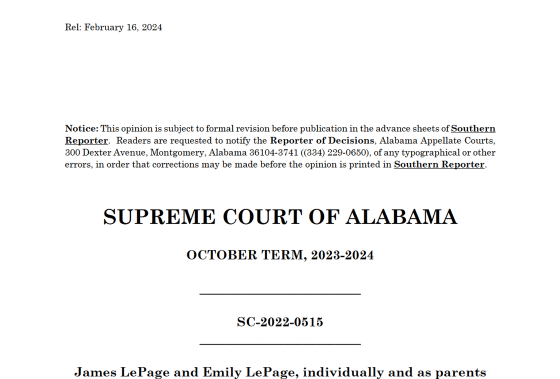The court has recognized that ``God created humans, so frozen embryos are also children with complete moral rights,'' and if you destroy surplus embryos during artificial insemination, you may be responsible for their death.

Decision - SUPREME COURT OF ALABAMA OCTOBER TERM, 2023-2024 SC-2022-0515.pdf
(PDF file) https://publicPortal-api.alappeals.gov/courts/68f021c4-64-4735-9a76-5360B23/cms/343D203A-B13D-8176-C4 6E3AE4F695/Docketentrydocuments/E3D95592-3cbe-4384- afa6-063d4595aa1d

Alabama Supreme Court frozen embryos decision may imperil IVF
https://www.usatoday.com/story/news/nation/2024/02/20/alabama-supreme-court-frozen-embryos-ruling-ivf/72662533007/
Frozen embryos are “children,” according to Alabama's Supreme Court | Ars Technica
https://arstechnica.com/science/2024/02/frozen-embryos-are-children-according-to-alabamas-supreme-court/
The Alabama Supreme Court's decision concerns an incident in which a patient at an IVF clinic slipped through an unlocked door to remove frozen embryos from storage, accidentally destroying them. IVF patients affected by the incident filed a civil lawsuit under state law for a ' wrongful death claim ' against the IVF clinic.
A wrongful death claim is when someone's irresponsible actions result in an unforeseen accident, and the family of the victim who dies as a result of the accident claims financial compensation for the loss. Family members who can bring a wrongful death claim include the deceased's spouse and parents, but the focus in this case was whether the frozen embryos could be recognized as 'children.'
Initially, a lower court in Alabama dismissed the lawsuit on the grounds that ``frozen embryos do not meet the definition of children,'' but the state Supreme Court ruled that ``embryos created through in vitro fertilization have moral rights even if they are not born.'' The court ruled that the child is a child. This makes the person who accidentally destroys the frozen embryo and the business operator who did not take measures to prevent such an accident liable for the death.
Alabama Supreme Court Chief Justice Tom Parker repeatedly cited Christian beliefs in his ruling, along with the Alabama Constitution, which protects unborn children. Presiding Judge Parker said, ``Man was created in the image of God before he was born, and since God considers the destruction of God's image to be blasphemy, we should not incur the wrath of a holy God.'' We cannot unjustly destroy human life.' Parker is a Republican and a longtime opponent of abortion.

In general artificial insemination, multiple eggs are collected by stimulating egg production using hormone therapy, etc., and the embryos created through in vitro fertilization at a clinic are implanted into the uterus in an attempt to become pregnant. Since there is a high possibility of failure at each stage of artificial insemination, in most cases multiple eggs are collected or multiple embryos are produced through in vitro fertilization, and any remaining embryos are stored as frozen embryos to provide insurance against failure.
If the artificial insemination is successful, you can choose to keep the remaining frozen embryos for future artificial inseminations, donate them to someone else who wants to get pregnant, donate them to research, or discard them. The U.S. Department of Health and Human Services estimates in 2020 that there are more than 600,000 frozen embryos in storage across the United States, and a significant percentage of them are expected to never make it to birth.
However, the latest Alabama Supreme Court ruling recognizes that frozen embryos have rights as 'children.' This could negatively impact artificial insemination clinics and patients, as it means that embryos destroyed during the artificial insemination process or later discarded may be subject to wrongful death lawsuits.
Tech media outlet Ars Technica says, ``Doctors may choose to make only one embryo at a time to avoid the liability associated with making extra embryos, or if an embryo does not survive the process. may refuse IVF altogether to avoid liability, which can make an already financially and emotionally exhausting IVF process even worse 'It could make it unaffordable for people who want to use it, and it could put clinics out of business.'
'This is what we feared and were concerned about,' said Barbara Collula, CEO of fertility support group

According to data on artificial insemination collected by the Centers for Disease Control and Prevention (CDC), in 2021, 238,126 patients performed a total of 413,776 artificial insemination cycles at 453 clinics in the United States, and 9 It is said that 1,906 people were born. Approximately 2.3% of all newborns born in 2021 in the United States are expected to be due to artificial insemination, and discontinuing artificial insemination could have a significant impact on the birth rate.
Related Posts:
in Note, Posted by log1h_ik







